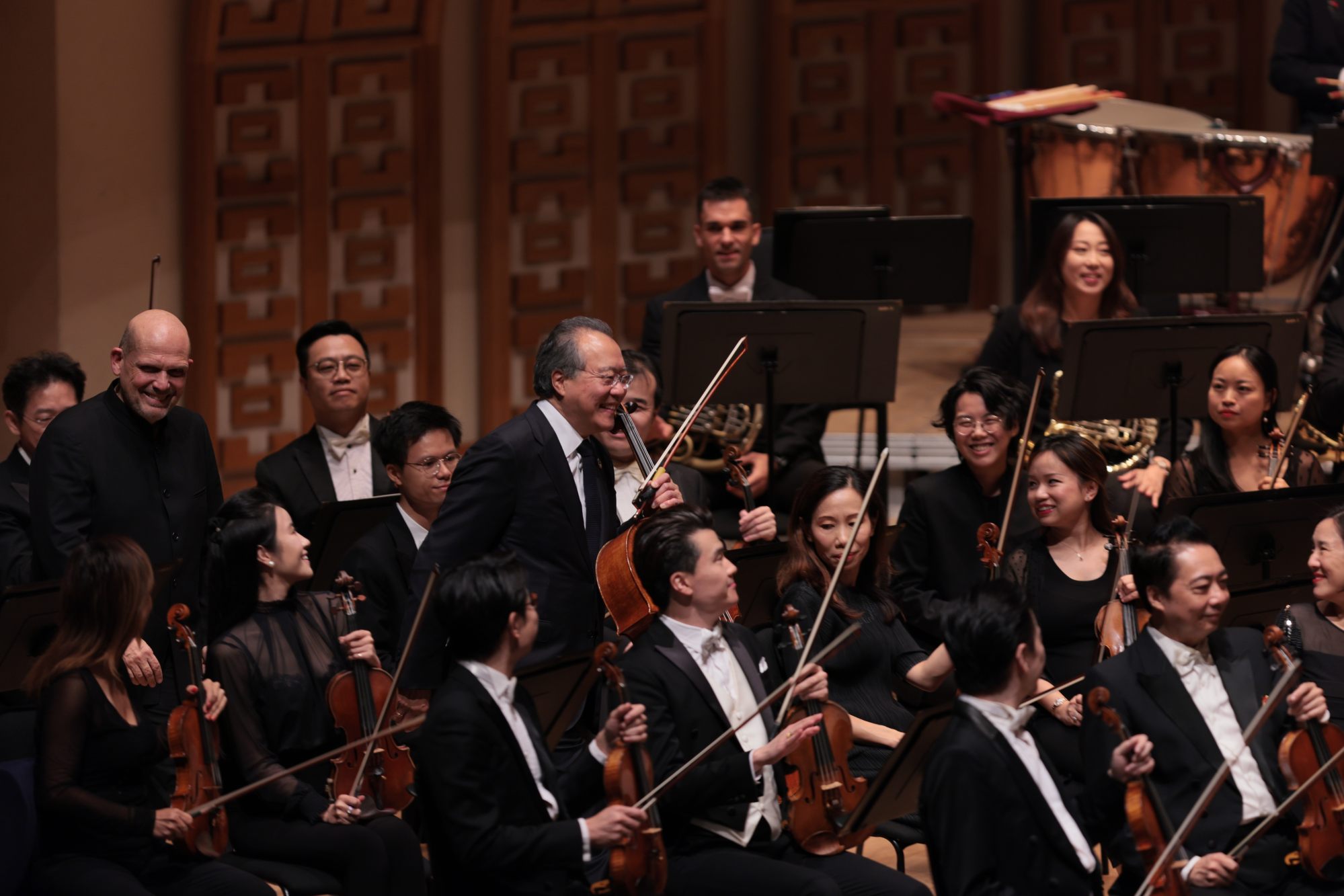
Review | Rock-star welcome for Yo-Yo Ma in concert with Hong Kong Philharmonic, and cellist doesn’t disappoint in a sublime reading of Dvorak concerto
- ‘It takes great listening to learn,’ cellist tells audience after performance with Hong Kong orchestra, and indeed they had hung on every note of Dvorak work
- Ma’s playing was warm and engaging and the orchestra in inspired form, as they were in a bravura performance of Tchaikovsky’s Capriccio Italien
Just as great orators lend words the power to inspire, the best instrumental soloists turn music into persuasive arguments.
Cellist Yo-Yo Ma, in his appearance with the Hong Kong Philharmonic on November 9, had plenty to say and knew just how to deliver it.
Under the baton of Jaap van Zweden, the American-Chinese superstar performed Dvorak’s revered cello concerto with the orchestra in a special concert to celebrate the 60th anniversary of Chinese University of Hong Kong.
AI can never beat triumphant human spirit, Yo-Yo Ma tells Hong Kong students
The two shorter works by Beethoven and Tchaikovsky that preceded the Dvorak were not exactly fillers.
Beethoven’s Leonore Overture No. 3 is an expression of nobility, tragedy, and ultimately freedom. The composer had intended it as an overture to his only opera, Fidelio, but deemed it unsuitable and far too heavy to precede the work’s first act, and tossed it aside. Yet the overture, named after Fidelio’s courageous heroine, remains popular to this day.
Van Zweden’s interpretation boded well. Subtle crescendos and diminuendos swelled in the strings, and finely balanced woodwind chorales ensured a smooth opening with airs of noble elegance.
Unfortunately, a sense of sameness in the dynamics began to set in, and some heavy-handedness in places meant the finer elements of Leonore’s operatic intrigue were missed.
An offstage trumpet fanfare might as well have been onstage given its overt, full sound in the wings, and violin entries hinting at liberty were too solo-like in approach. It was a case of giving away too much too early.
As rousing as the frenetic final passages were, the freedom hymn would have been far more stirring had the excitement not peaked so soon.
HK Phil’s fabulous Tchaikovsky, Joshua Bell’s fire and finesse
The contrasting work that followed, however, was far more successful.
Tchaikovsky’s Capriccio Italien, an unashamedly lighthearted potpourri of more-or-less authentic Italian tunes inspired by the Russian’s sunny breaks in Rome, was a fun-filled romp.
Trumpets were spot on in their opening fanfare, first violins were beefy and unanimous up high on the G string, and the flamboyant, folky tunes were played with whimsy and plenty of bravura.
Yo-Yo Ma, Lang Lang among highlights of Hong Kong Phil’s 2023/24 season
The post-break buzz was, as expected, palatable.
As the multiple Grammy award-winning Ma bounded onto the stage like a 68-year-old going on 30, the audience reception was like one more commonly reserved for rock stars.
There were no disappointments. The clarity of Ma’s focused tone impressed throughout, oozing warmth and engaging listeners right up to the last rows of the upper balconies.

The might of the Niagara Falls (Dvorak’s main inspiration for composing something grand in the key of B minor) and melodies that expressed the Czech’s yearning for his beloved Bohemian countryside were all vividly portrayed by Ma.
The orchestra’s melancholic opening to the concerto’s Allegro movement combined passion with storminess. Lin Jiang’s glorious horn solo shone and helped set an idyllic scene for Ma’s convincing display of technique and brilliant sound projection.
His communication with the musicians around him was a joy to witness as he constantly spurred them on and embraced them, even as he added colour to his own fluid and elegant string crossing.
The hushed passages of quiet reflection were sublime and listeners seemed to hang on every note, almost as if they had pre-empted his wise words that followed the performance: “It takes great listening to learn.”
Violinist Veronika Eberle outstanding in concerto double bill
The Adagio movement was marked by glimpses of profundity, notably in Ma’s brief solo cadenza, which was an absolute gem in its dreamlike simplicity.
The finale was gutsy and playful by turns, including a joyful exchange between Ma’s cello and Andrew Simon’s clarinet, and a violin solo by concertmaster Jing Wang towards the end that was full of vigour and clearly inspired by Ma’s unflagging enthusiasm.
When the loud thud of a mobile device hitting the floor was heard during the dying notes of Ma’s heartfelt encore (a solo version of the spiritual “Nobody knows the trouble I’ve seen” and a segue into the theme from Dvorak’s Adagio from the concerto) it felt more devastating than usual.
For Yo-Yo Ma had indeed reminded everyone to listen greatly.
“CUHK 60th Anniversary: Yo-Yo Ma & HK Phil”, Hong Kong Cultural Centre Concert Hall. Reviewed: November 9.

